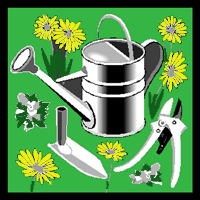QEW Tips Eco-friendly Yards and Gardens
THE AUDUBON SOCIETY has an attractive and informative poster called "10 Commandments for a Healthy Yard" that includes the following tips:
- Go organic. (Avoid toxic chemicals, use compost.)
- Make your turf tough. (Use grass varieties adapted to your area, cut high, water only when needed.)
- Go native. (Save work and nurture wildlife habitats by using native plants.)
Know your enemies. (Use field guides to identify pests and use appropriate controls only as needed.)
- Treat only when necessary. (Use non-toxic methods, including picking off insects and hosing off plants.)
- Pick your pesticides.* (Know the differences among chemicals, including EPA toxicity ratings and avoid "shotgun" approaches that harm beneficial insects.)
- Use biological controls or biopesticides. (Wasps, BT, etc., which are relatively harmless and don't persist in the environment.)
- Follow directions and protect yourself. (Read labels, wear protection, use no more than recommended, use and store safely.)
- Respect your neighbor's "Right to Know." (Let neighbors know of your control plans and ask to be informed of theirs. Find out what controls your town may be using in your neighborhood, and ask them to consider alternatives.)
- Teach tolerance and be tolerant. (Promote diversity of plant, animal, and insect species and don't try so hard to have a perfect yard or garden that you put people and wildlife at risk.
To order the poster, contact Audubon at audubonathome@audubon.org
To join Audubon, call 800/274-4201. www.audubon.org
 |
*Note from QEW's webmaster: Many environmentalists object to any "pesticide" use. Indeed, widespread use of persistent organic chemicals (which are in most commerical lawn chemicals) is at the "root" of a host of serious ecological problems. But the term "pesticide" covers both natural and chemical insecticides, herbicides, and fungicides. Milky Spore Disease, for example, can be a safe and effective natural method of treating a serious infestation of Japanese Beetles, while fitting the definition of "pesticide." Diatomaceous earth, pyrethrums, and other botanical products also are effective natural controls for some kinds of insect problems. |
For more information, see the lawn care section of the Ecology Action Centre's
website: www.ecologyaction.ca/urban_issues/urban_proj_pest_lawncare.shtm
|



